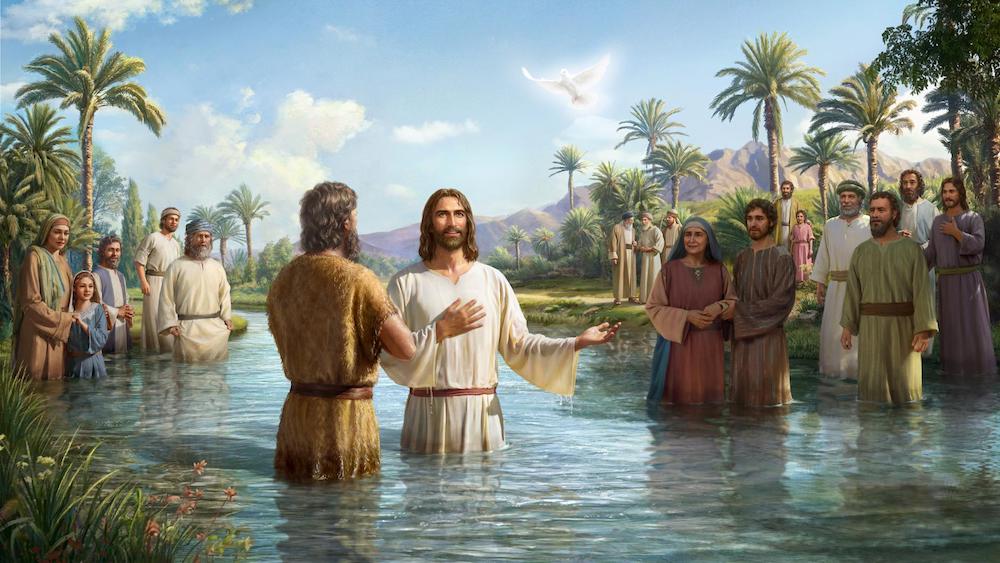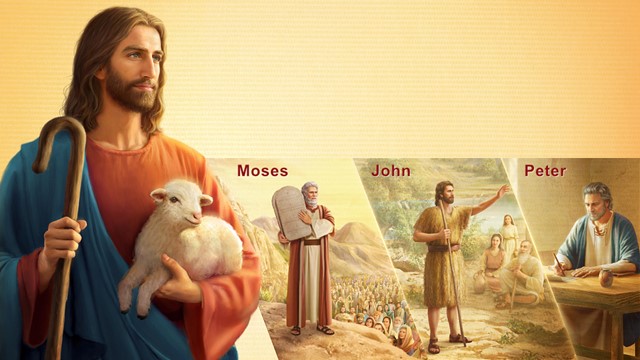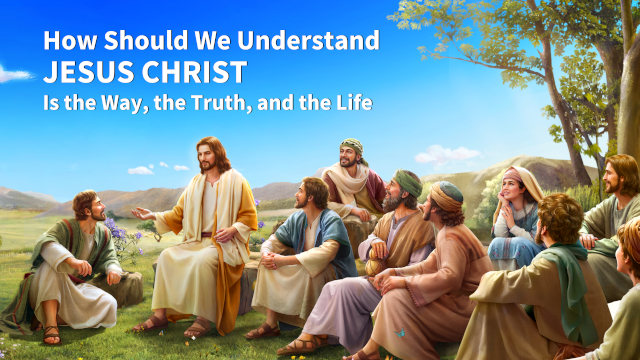Whether Christ is the Son of God or God Himself

Bible Verses for Reference:
“Jesus said to him, I am the way, the truth, and the life: no man comes to the Father, but by Me. If you had known Me, you should have known My Father also: and from now on you know Him, and have seen Him. Philip said to Him, Lord, show us the Father, and it suffices us. Jesus said to him, Have I been so long time with you, and yet have you not known Me, Philip? he that has seen Me has seen the Father; and how say you then, Show us the Father? Believe you not that I am in the Father, and the Father in Me? the words that I speak to you I speak not of Myself: but the Father that dwells in Me, He does the works. Believe Me that I am in the Father, and the Father in Me: or else believe Me for the very works’ sake” (Jhn 14:6–11).
“I and My Father are one” (Jhn 10:30).
Relevant Words of God:
The “incarnation” is God’s appearance in the flesh; God works among created mankind in the image of the flesh. So for God to be incarnated, He must first be flesh, flesh with normal humanity; this is the most basic prerequisite. In fact, the implication of God’s incarnation is that God lives and works in the flesh, that God in His very essence becomes flesh, becomes a man.
Excerpted from “The Essence of the Flesh Inhabited by God” in The Word Appears in the Flesh
Incarnation means that God’s Spirit becomes a flesh, that is, God becomes flesh; the work that the flesh does is the work of the Spirit, which is realized in the flesh, expressed by the flesh. No one except God’s flesh can fulfill the ministry of the incarnate God; that is, only God’s incarnate flesh, this normal humanity—and no one else—can express the divine work. If, during His first coming, God had not possessed normal humanity before the age of twenty-nine—if as soon as He was born He could work miracles, if as soon as He learned to speak He could speak the language of heaven, if the moment He first set foot upon the earth He could apprehend all worldly matters, discern every person’s thoughts and intentions—such a person could not have been called a normal man, and such flesh could not have been called human flesh. If this were the case with Christ, then the meaning and the essence of God’s incarnation would be lost. That He possesses normal humanity proves that He is God incarnated in the flesh; the fact that He undergoes a normal human growth process further demonstrates that He is a normal flesh; moreover, His work is sufficient proof that He is God’s Word, God’s Spirit, become flesh.
Excerpted from “The Essence of the Flesh Inhabited by God” in The Word Appears in the Flesh
Given that God becomes flesh, He realizes His essence within His flesh, such that His flesh is sufficient to undertake His work. Therefore, all the work of God’s Spirit is replaced by the work of Christ during the time of incarnation, and at the core of all work throughout the time of incarnation is the work of Christ. It cannot be commingled with work from any other age. And since God becomes flesh, He works in the identity of His flesh; since He comes in the flesh, He then finishes in the flesh the work that He ought to do. Be it the Spirit of God or be it Christ, both are God Himself, and He does the work that He ought to do and performs the ministry that He ought to perform.
Excerpted from “The Essence of Christ Is Obedience to the Will of the Heavenly Father” in The Word Appears in the Flesh
The humanity of the incarnate God exists for the sake of His corporeal essence; there can be no flesh without humanity, and a person without humanity is not a human being. In this way, the humanity of God’s flesh is an intrinsic property of God’s incarnate flesh. To say that “when God becomes flesh He is entirely divine, and not at all human,” is blasphemy, for this statement simply does not exist, and violates the principle of incarnation. Even after He begins to perform His ministry, He still lives in His divinity with a human outer shell when He does His work; it is just that at the time, His humanity serves the sole purpose of allowing His divinity to perform the work in the normal flesh. So the agent of the work is the divinity inhabiting His humanity. His divinity, not His humanity, is at work, yet this divinity is hidden within His humanity; in essence, His work is done by His complete divinity, not by His humanity. But the performer of the work is His flesh. One could say that He is a man and also is God, for God becomes a God living in the flesh, with a human shell and a human essence but also the essence of God. Because He is a man with the essence of God, He is above all created humans, above any man who can perform God’s work. And so, among all those with a human shell like His, among all those who possess humanity, only He is the incarnate God Himself—all others are created humans. Though they all have humanity, created humans have nothing but humanity, while God incarnate is different: In His flesh He not only has humanity but, more importantly, divinity. His humanity can be seen in the outer appearance of His flesh and in His everyday life, but His divinity is difficult to perceive. Because His divinity is expressed only when He has humanity, and is not as supernatural as people imagine it to be, it is extremely difficult for people to see. Even today, people have the utmost difficulty fathoming the true essence of the incarnate God. Even after I have spoken about it at such length, I expect it is still a mystery to most of you. In fact, this issue is very simple: Since God becomes flesh, His essence is a combination of humanity and divinity. This combination is called God Himself, God Himself on earth.
Excerpted from “The Essence of the Flesh Inhabited by God” in The Word Appears in the Flesh
The incarnate Son of man expressed God’s divinity through His humanity and conveyed the will of God to mankind. And through His expression of God’s will and disposition, He also revealed to people the God that cannot be seen or touched who dwells in the spiritual realm. What people saw was God Himself in tangible form, made of flesh and blood. So the incarnate Son of man made things such as the identity of God Himself, God’s status, image, disposition, and what He has and is, concrete and humanized. Even though the external appearance of the Son of man had some limitations regarding the image of God, His essence and what He has and is were entirely able to represent the identity and status of God Himself—there were merely some differences in the form of expression. We cannot deny that the Son of man represented the identity and status of God Himself, both in the form of His humanity and in His divinity. During this time, however, God worked through the flesh, spoke from the perspective of the flesh, and stood before mankind with the identity and status of the Son of man, and this gave people the opportunity to encounter and experience the true words and work of God among mankind. It also allowed people insight into His divinity and His greatness in the midst of humility, as well as to gain a preliminary understanding and definition of the authenticity and reality of God. Even though the work completed by the Lord Jesus, His ways of working, and the perspective from which He spoke differed from God’s real person in the spiritual realm, everything about Him truly represented God Himself, whom mankind had never seen before—this cannot be denied! That is to say, no matter in what form God appears, no matter from which perspective He speaks, or in what image He faces mankind, God represents nothing but Himself. He can represent neither any one human, nor any of corrupted mankind. God is God Himself, and this cannot be denied.
Excerpted from “God’s Work, God’s Disposition, and God Himself III” in The Word Appears in the Flesh
When Jesus called God in heaven by the name of Father as He prayed, this was done only from the perspective of a created man, only because the Spirit of God had put on an ordinary and normal flesh and had the exterior cover of a created being. Even if within Him was the Spirit of God, His exterior appearance was still that of a normal man; in other words, He had become the “Son of man” of which all men, including Jesus Himself, spoke. Given that He is called the Son of man, He is a person (whether man or woman, in any case one with the exterior shell of a human being) born into a normal family of ordinary people. Therefore, Jesus calling God in heaven by the name of Father was the same as how you at first called Him Father; He did so from the perspective of a created man. Do you still remember the Lord’s Prayer that Jesus taught you to memorize? “Our Father in heaven….” He asked all men to call God in heaven by the name of Father. And since He too called Him Father, He did so from the perspective of one who stands on an equal footing with you all. Since you called God in heaven by the name of Father, Jesus saw Himself to be on equal footing with you, and as a man on earth chosen by God (that is, the Son of God). If you call God Father, is this not because you are a created being? However great the authority of Jesus on earth, prior to the crucifixion, He was merely a Son of man, governed by the Holy Spirit (that is, God), and one of the earth’s created beings, for He had yet to complete His work. Therefore, His calling God in heaven Father was solely His humility and obedience. His addressing God (that is, the Spirit in heaven) in such a manner, however, does not prove that He was the Son of the Spirit of God in heaven. Rather, it was simply that His perspective was different, not that He was a different person. The existence of distinct persons is a fallacy! Prior to His crucifixion, Jesus was a Son of man bound by the limitations of the flesh, and He did not fully possess the authority of the Spirit. That is why He could only seek the will of God the Father from the perspective of a created being. It is as He thrice prayed in Gethsemane: “Not as I will, but as You will.” Before He was laid on the cross, He was but the King of the Jews; He was Christ, the Son of man, and not a body of glory. That is why, from the standpoint of a created being, He called God Father. Now, you cannot say that all who call God Father are the Son. If this were so, then would you not have all become the Son once Jesus taught you the Lord’s Prayer? If you are still not convinced, then tell Me, who is the one that you call Father? If you are referring to Jesus, then who is the Father of Jesus to you? After Jesus went away, this idea of the Father and the Son was no more. This idea was only appropriate for the years when Jesus became flesh; under all other circumstances, the relationship is one between the Lord of creation and a created being when you call God Father.
Excerpted from “Does the Trinity Exist?” in The Word Appears in the Flesh
There are others who say, “Did not God expressly state that Jesus was His beloved Son?” Jesus is the beloved Son of God, in whom He is well pleased—this was certainly spoken by God Himself. That was God bearing witness to Himself, but merely from a different perspective, that of the Spirit in heaven bearing witness to His own incarnation. Jesus is His incarnation, not His Son in heaven. Do you understand? Do not the words of Jesus, “I am in the Father, and the Father in Me,” indicate that They are one Spirit? And is it not because of the incarnation that They were separated between heaven and earth? In reality, They are still one; no matter what, it is simply God bearing witness to Himself. Owing to the change in ages, the requirements of the work, and the differing stages of His management plan, the name by which man calls Him also differs. When He came to carry out the first stage of work, He could only be called Jehovah, who is the shepherd of the Israelites. In the second stage, the incarnate God could only be called Lord, and Christ. But at that time, the Spirit in heaven stated only that He was the beloved Son of God and made no mention of His being the only Son of God. This simply did not happen. How could God have an only child? Then would God not have become man? Because He was the incarnation, He was called the beloved Son of God, and, from this, came the relationship between Father and Son. It was simply because of the separation between heaven and earth. Jesus prayed from the perspective of the flesh. Since He had put on a flesh of such normal humanity, it is from the perspective of the flesh that He said: “My outer shell is that of a created being. Since I put on a flesh to come to this earth, I am now a long, long way from heaven.” For this reason, He could only pray to God the Father from the perspective of the flesh. This was His duty, and it was that which the incarnate Spirit of God should be furnished with. It cannot be said that He was not God simply because He prayed to the Father from the perspective of the flesh. Though He was called the beloved Son of God, He was still God Himself, for He was but the incarnation of the Spirit, and His essence was still the Spirit.
Excerpted from “Does the Trinity Exist?” in The Word Appears in the Flesh
What man first saw was the Holy Spirit descending like a dove upon Jesus; it was not the Spirit exclusive to Jesus, but rather the Holy Spirit. Then can the Spirit of Jesus be separated from the Holy Spirit? If Jesus is Jesus, the Son, and the Holy Spirit is the Holy Spirit, then how could They be one? The work could not be carried out if so. The Spirit within Jesus, the Spirit in heaven, and the Spirit of Jehovah are all one. It is called the Holy Spirit, the Spirit of God, the sevenfold intensified Spirit, and the all-inclusive Spirit. The Spirit of God can carry out much work. He is able to create the world and destroy it by flooding the earth; He can redeem all mankind, and moreover, He can conquer and destroy all mankind. This work is all carried out by God Himself and cannot be done by any of the personhoods of God in His stead. His Spirit can be called by the name of Jehovah and Jesus, as well as the Almighty. He is the Lord, and Christ. He can also become the Son of man. He is in the heavens and also on the earth; He is on high above the universes and among the multitude. He is the only Master of the heavens and earth! From the time of creation until now, this work has been carried out by the Spirit of God Himself. Be it the work in the heavens or in the flesh, all is carried out by His own Spirit. All creatures, whether in heaven or on earth, are in the palm of His almighty hand; all of this is the work of God Himself and can be done by no other in His stead. In the heavens, He is the Spirit but also God Himself; among men, He is flesh but remains God Himself. Though He may be called by hundreds of thousands of names, He is still Himself, the direct expression of His Spirit. The redemption of all mankind through His crucifixion was the direct work of His Spirit, and so too is the proclamation unto all nations and all lands during the last days. At all times, God can only be called the almighty and one true God, the all-inclusive God Himself. The distinct persons do not exist, much less this idea of the Father, the Son, and the Holy Spirit. There is only one God in heaven and on earth!
Excerpted from “Does the Trinity Exist?” in The Word Appears in the Flesh





